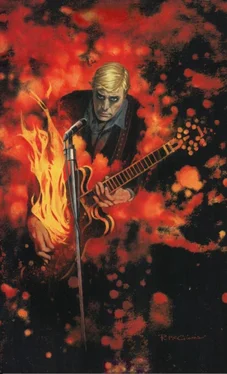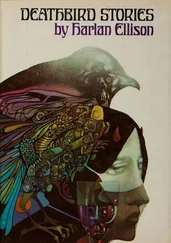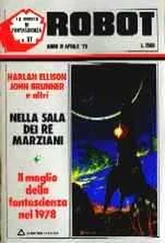Joe Costanza and Shelly held long conferences, far into the night, first mapping out the larger areas of promotion, then fine tuning the program, eventually dwelling with almost pathological attention on the smallest details:
Who should get the first news break about Stag?
(If we give it to Cholly Knickerbocker no one will notice it outside of New York, but we’ll have a strong source in Manhattan for future use. But if we plant it with Winchell, not only will it make his column, but he’s got that new tv spot, and a mention there—mysteriously tipped as he’s made a rep doing it for the past seven hundred years—we’ll get a nation-wide break. Then there’s Kilgallen, or maybe Hedda … or a parlay, handing it out in three different regional areas … the overlap might not be too bad. But if one tipped to the other’s having the same info, we might make an enemy or three …)
What label should we record him on?
(If we set up our own company, we lose out on the effective promotion someone like Columbia or Victor might give us. But if we go for one of the big boys, we’ll have to cut them in for a taste …)
Who gets the first tv look at him?
(If we go the Dick Clark route, then he gets identified as a teen star, and the adults sneer. If we avoid Clark and go the Sullivan or Dinah Shore way, we lose the instant identification of the teenagers. How about …)
What product tie-ins should we allow?
(Cereals are out—pre-teens. The T-shirt, charm bracelet, chewing gum bit might be a little too adolescent. If we try to foist off Stag Preston dinner jackets we’ll get laughed at all the way to AfterSix and back. No, best we stay in the sport shirt and after-shave lotion area, with a try for the teens on their own level, but decorous, like very decorous …)
Finally, it came time for the pitch.
Shelly made his phone calls—how would the hipster operate so easily, without that wondrous gadget?—and the studio was reserved. A rented studio, a pick-up orchestra, special arrangements commissioned by an unnamed top female exec of a top record company, mastered by a top technician working for one of the smaller jazz labels, and a small group of background singers prepared to drop in Doowah or Oo-oo-ooo when needed.
Out of that session (it was a take on the third try) came Stag Preston’s first record, “I Don’t Know You Anymore,” b/w “Car Hop Angel.”
Demo discs were cut off the master and surreptitiously circulated to the four or five most influential A&R men in the trade, with no build-up, merely the word that they had come over from Freeport. They were listened to with careful attention, and tentative feelers came back to the suite in the Sheraton-Astor. Shelly held them off, parlaying interest in the anonymous singer (for there had been no explanatory label on the demos) and promising something very interesting, very soon.
Something very soon was three days later; something very interesting was a personal invitation to the A&R men who had received the demos, to be Colonel Jack Freeport’s guests at a high school sock hop in Parma, Ohio.
A chartered plane flew Freeport, Shelly, Joe Costanza and their guests to Cleveland where three Cadillacs sat panting, prepared for the drive to the suburb of Parma.
The high school was ablaze with lights, and one of Cleveland’s leading disc jockeys, Bob Mandle, was waiting. The sock hop was a benefit to raise money for the high school’s new library and auditorium. Mandle had been contacted to plan the show, had imported up-and-coming rock’n’roll talent who would work cuffola for the publicity—and Freeport had mildly suggested Stag Preston be made a featured headliner.
He was billed as “A Surprise Mystery Guest” which conjured images of anyone from Frankie Avalon to Lanny Ross, depending on who was conjuring.
The A&R men knew only that they were going to meet the mystery talent Jack Freeport had avoided discussing with them. Shelly could see interest in their faces; arrangements such as these were tantamount to an offer of big gold.
When Mandle led them into the huge gym, Shelly realized Freeport had done more than merely suggest that Mandle feature Stag. (It was a sort of brainwashing that had been effected by the weeks of preparation of their talent; he no longer thought of the boy as Luther; now he was Stag, even in unguarded thoughts.)
A suggestion might have gotten Stag a spot on the bill, but the opulence of the decorations, the almost studiedly melodramatic stage on which the artists would perform— Shelly dredged up memories of Warner Bros. musicals circa 1940—meant the Colonel had shelled out some sugar to swing Mandle to his way of thinking. Some money that had been spent to do the place up the way Freeport thought it should be done up—all the better to showcase you, my dear: a contribution to the library/auditorium fund—one of Mandle’s weak spots in these days of public service, now that the payola stink was dulled by the shortness of public memory.
“Seats for you in the front row,” Mandle said, grinning, his expression that of a college senior. He waved them to the padded chairs facing the stage. “Show’s about to start.”
Already the gym was filled. Almost eight hundred boys and girls were jammed into the gym, filling the chairs behind the A&R men, overflowing into the back of the room where they were packed, standing.
Freeport nodded to Mandle, who made a thumb and forefinger circle, still grinning boyishly. Then he went behind the rigged curtains, and the sounds of guitars tuning, squawking saxophones, a set of traps floated out to key the high school crowd higher.
Shelly leaned over to Freeport. “I’ll take a look in on the kid. See how he’s doing.” Freeport nodded, his eyes straight ahead. This was payoff time for the Colonel, and his stomach was erupting. Shelly withdrew a bottle of capsules from his jacket and pressed it into the older man’s hand. Then he rose, excused himself, smiled at Sid Feller of ABC-Paramount and moved toward the swinging doors to the locker rooms.
The locker rooms had been set up as dressing rooms and Shelly passed down the rows of metal lockers noting the half dozen groups or individual talents Mandle had managed to suck into this benefit.
Luther was alone in the last row.
He was sitting disconsolately on a bench, clad only in socks, shorts and T-shirt. His hands down between his knees. The expression he wore was one of expectation, not nervousness. Shelly lit a cigarette and stood behind the boy, studying him.
Stag Preston sat there. A shadow, a flicker, a hint of Luther Sellers remained, but now it was Stag Preston who looked out of the dark, hungry eyes. It was someone new, a creature of comment and gold dust and wishful thinking. But it breathed, and it moved, and it was real.
“Scared?” Shelly said, softly. He realized as he said it that he hoped it was true; there had to be a chink in the armor somewhere. But even as Stag Preston’s head came up and around, Shelly knew it wasn’t true. The hard, wanting gleam was still there, shining dully.
“Hi, Shelly,” Stag answered.
“Scared?” he asked again, by rote.
Stag Preston’s face twisted in the semblance of a smile. His voice sounded far away, bemused, preoccupied: “No, not scared, just thinkin’.”
Shelly sucked on the cigarette. “About what?”
“Oh, about this ‘n’ that. Thinkin’ about Lou’ville and gettin’ outta there … ‘bout what I was, what I’m gonna be.”
What are you going to be, Stag; what ? Shelly thought.
“You haven’t come that far yet,” Shelly said.
Stag Preston looked at him sharply. “Oh, man, you don’t know . You just don’t know ! I’ve come all the world away. I’ve made it out, I’ve busted loose, an’ I ain’t—I’m not goin’ to stop till I’ve got it all. All of it. You see.”
Читать дальше












